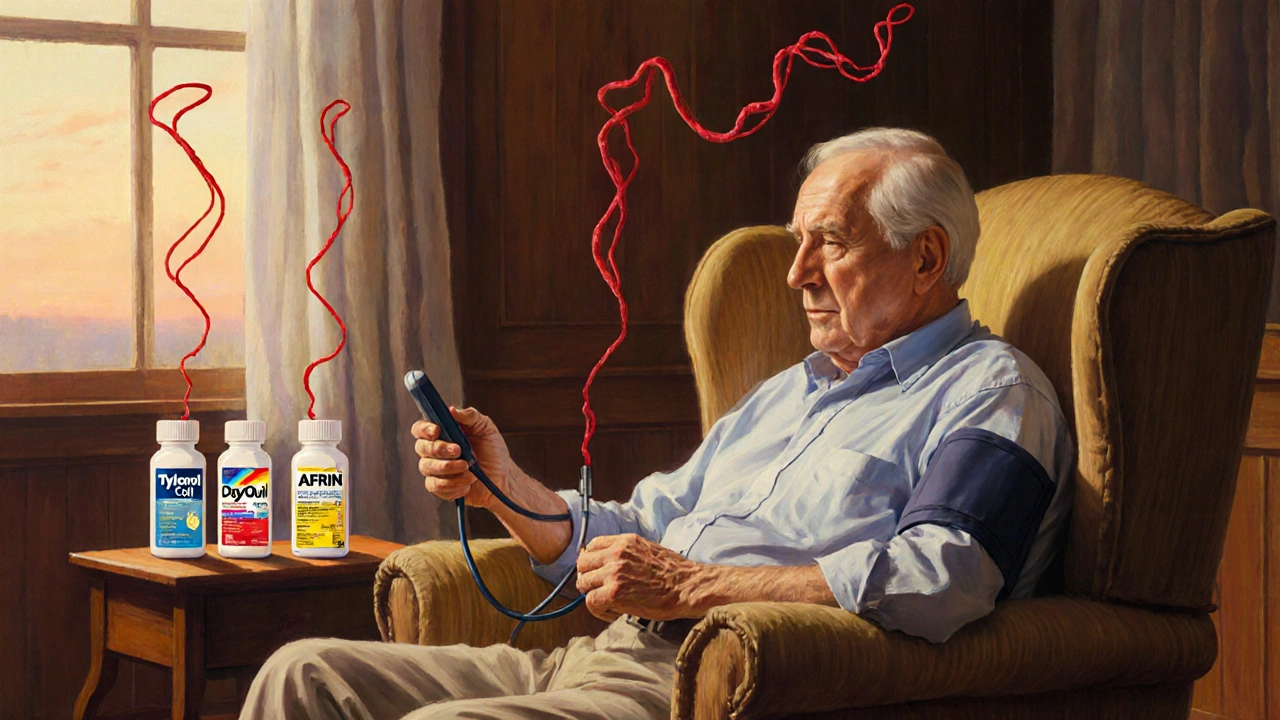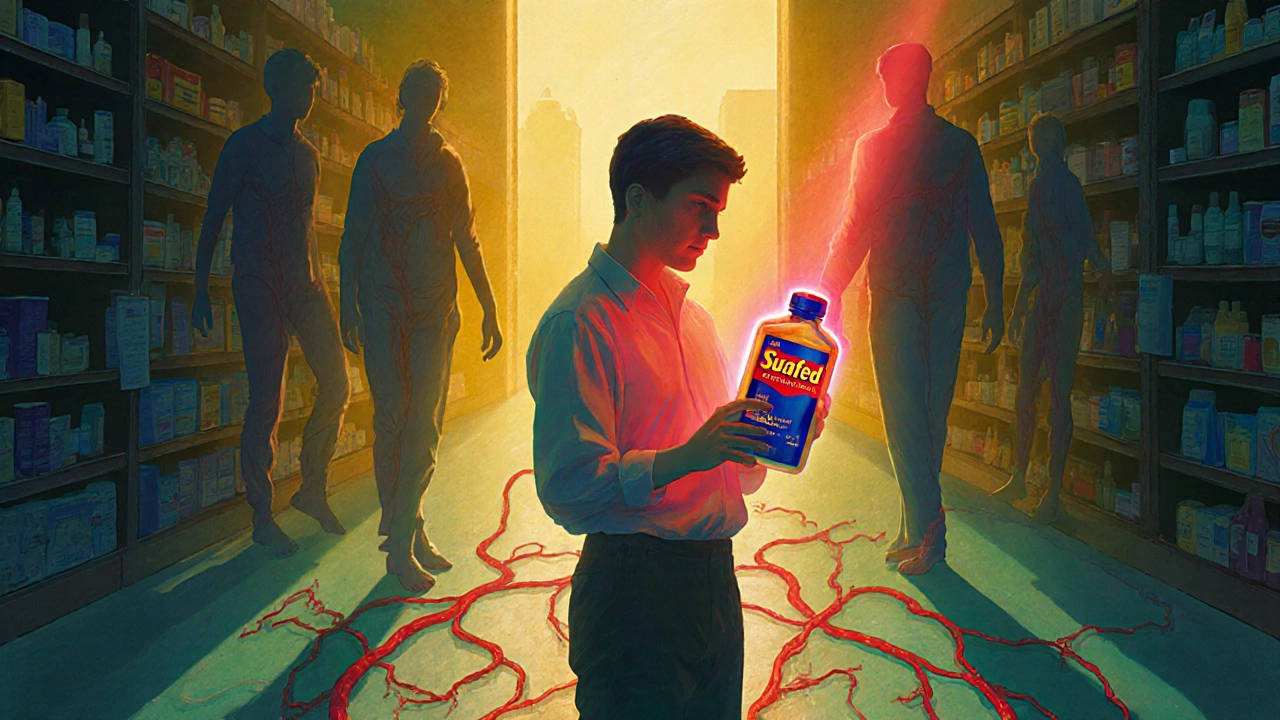Decongestant Safety Checker
How This Tool Works
Enter a cold/flu medicine name or active ingredient to see if it contains dangerous decongestants. The tool identifies ingredients like pseudoephedrine, phenylephrine, and oxymetazoline that can dangerously raise blood pressure.
Safe for High Blood Pressure
This product does not contain dangerous decongestants. You can use it with your blood pressure medication.
Dangerous for High Blood Pressure
Contains decongestants that may dangerously raise blood pressure. Avoid this product and consult your doctor.
How to use:
• Check labels for "decongestant", "pseudoephedrine", "phenylephrine" or names ending in "-D"
• Avoid multi-symptom products unless labeled "decongestant-free"
• Always ask your pharmacist before taking any new medicine
Many people reach for decongestants when they have a stuffy nose - it’s quick, easy, and available over the counter. But if you have high blood pressure, that little bottle of cold medicine could be putting your heart at risk. You might not realize it, but common cold and flu products like pseudoephedrine and phenylephrine can spike your blood pressure, interfere with your medications, and even trigger dangerous heart rhythms. This isn’t just a warning on the label - it’s a real, documented danger that affects thousands of people every year.
How Decongestants Raise Blood Pressure
Decongestants like pseudoephedrine and phenylephrine work by tightening blood vessels in your nose to reduce swelling and mucus. That’s why your nose clears up. But here’s the catch: those same blood vessels are everywhere - in your arms, legs, brain, and heart. When the drug tightens them system-wide, your blood pressure goes up. Your heart has to pump harder to get blood through narrower arteries. That extra strain can be harmless for a healthy person. But for someone with high blood pressure, it’s like revving an engine that’s already overheating.
Studies show that pseudoephedrine, the most common decongestant, can raise systolic blood pressure by 2 to 5 mm Hg on average. That might sound small, but for someone with uncontrolled hypertension, that’s enough to push them into a dangerous range. Some patients - about 5 to 10% - see much larger spikes, sometimes over 20 mm Hg. In rare cases, this has led to heart attacks, strokes, or irregular heartbeats. A 2023 analysis in US Pharmacist even documented a 5-year-old child who developed high blood pressure after taking a phenylephrine-based cold syrup. Her pressure returned to normal only after stopping the medicine.
Which Decongestants Are the Biggest Risk?
Not all decongestants are the same, but the most dangerous ones are the ones you’ll find in almost every cold aisle:
- Pseudoephedrine (Sudafed, Claritin-D, Zyrtec-D) - the most studied and most potent. It’s behind the pharmacy counter in the U.S. for a reason.
- Phenylephrine (Sudafed PE, Robitussin Multi-Symptom) - now the most common OTC decongestant after pseudoephedrine was restricted. But recent research shows it’s just as risky for blood pressure, even if it’s less effective at relieving congestion.
- Oxymetazoline (Afrin nasal spray) - used locally, but if used too long or too often, it can be absorbed into the bloodstream and raise blood pressure.
- Ephedrine - banned in many places, but still found in some herbal supplements. Extremely dangerous for heart health.
Even if you think you’re safe because you’re only using a nasal spray, you’re not. These ingredients don’t stay in your nose. They get absorbed. And if you’re on blood pressure meds like beta-blockers, ACE inhibitors, or diuretics, the decongestant can cancel out their effects - or make them work too hard, causing side effects like dizziness or fainting.
Hidden in Plain Sight: Multi-Symptom Cold Products
The biggest danger isn’t the standalone decongestant. It’s the multi-symptom cold and flu pills you grab without thinking. You’re not looking for a decongestant - you’re looking for relief from a sore throat, cough, and congestion. But most of these products combine three or four active ingredients. And one of them is almost always a decongestant.
Here are common products you should avoid if you have high blood pressure:
- Tylenol Cold and Flu
- Advil Multi-Symptom Cold and Flu
- Benadryl Allergy Plus Congestion
- Mucinex Sinus Max
- DayQuil and NyQuil Cold & Flu
Check the label. Look for the words “decongestant,” “pseudoephedrine,” “phenylephrine,” or “D” at the end of the name. If you see any of those, put it back. Even if you think you’re only taking one pill, the dose adds up - especially if you’re also taking other OTC meds.

Who’s at the Highest Risk?
Not everyone with high blood pressure will have a bad reaction - but some people are much more vulnerable:
- Those with uncontrolled hypertension (blood pressure above 140/90)
- People with heart disease, including prior heart attacks or heart failure
- Those with irregular heart rhythms (like atrial fibrillation)
- Patients with Prinzmetal angina (a rare type of chest pain caused by artery spasms)
- Anyone taking MAO inhibitors (like Nardil or Parnate) - combining these with decongestants can cause a life-threatening spike in blood pressure
- Older adults taking multiple medications - the more drugs you’re on, the higher the chance of a dangerous interaction
Even if your blood pressure is “controlled” with medication, you’re not out of the woods. The American Heart Association says you should still talk to your doctor before using any decongestant. Blood pressure can spike unpredictably, especially under stress, illness, or sleep deprivation.
What Should You Do Instead?
You don’t have to suffer through a stuffy nose. There are safe alternatives:
- Saline nasal spray - no drugs, no side effects. Just salt water to flush out mucus.
- Steam inhalation - breathe in warm steam from a bowl of hot water or a hot shower. It loosens congestion naturally.
- Humidifiers - keeping the air moist helps your nasal passages stay clear.
- Antihistamines without decongestants - like plain loratadine (Claritin) or cetirizine (Zyrtec). These help with allergies but won’t raise your blood pressure.
- Elevating your head while sleeping - reduces nighttime congestion without any meds.
Some people turn to herbal remedies like ephedra or bitter orange - but these can be just as dangerous as synthetic decongestants. Stick to proven, safe options.

When to Talk to Your Doctor or Pharmacist
Don’t guess. Don’t assume. If you have high blood pressure and feel a cold coming on, talk to your doctor or pharmacist before buying anything. Pharmacists in the U.S. are required to screen you before selling pseudoephedrine - use that moment. Ask: “Is this safe for someone with high blood pressure?”
Bring your entire medication list - including vitamins and supplements. Many people don’t realize that even a daily multivitamin with iron or a weight-loss supplement can interact with blood pressure drugs. Your pharmacist can scan all your meds and flag hidden risks.
Also, ask about your blood pressure monitoring. If you’re going to take a decongestant - even under medical supervision - check your pressure before and after. Keep a log. If your numbers jump more than 10 mm Hg systolic, stop the medicine and call your doctor.
Why This Problem Keeps Happening
Despite decades of warnings, people still use decongestants without knowing the risk. Why? Because the labels are confusing. The FDA changed the wording from “Do not use if you have high blood pressure” to “Ask your doctor before use if you have high blood pressure.” That sounds safer - but it also sounds like it might be okay if you just ask. Many people don’t ask. They just assume it’s fine.
Surveys show that about 15% of hypertensive patients still take decongestants regularly. Many don’t recognize the ingredients. Others think “natural” means safe. Some just don’t know they have high blood pressure - it’s often called the silent killer for a reason.
And with the rise of combination products, the risk is growing. Elderly patients, who often take multiple prescriptions, are especially vulnerable. One pill for pain, one for sleep, one for allergies - and suddenly, they’ve taken three decongestants in a week without realizing it.
Bottom Line: Be Informed, Not Afraid
You don’t need to avoid all cold medicine forever. You just need to be smart about it. High blood pressure doesn’t mean you can’t get better when you’re sick - it just means you need to choose your tools carefully.
Always read the label. Know what’s in your medicine. Talk to your pharmacist. Use saline sprays and steam when you can. And if you’re unsure - don’t take it. Your heart will thank you.
Can I take pseudoephedrine if my blood pressure is controlled?
Even if your blood pressure is controlled, pseudoephedrine can still cause spikes in some people. The American Heart Association advises against it unless your doctor approves it and you monitor your pressure closely. Extended-release forms may be less risky than immediate-release, but they’re not safe for everyone. Always consult your doctor first.
Is phenylephrine safer than pseudoephedrine?
No. While phenylephrine was promoted as a safer alternative after pseudoephedrine was restricted, recent studies show it raises blood pressure just as much - if not more - in some patients. It’s also less effective at relieving congestion. If you have high blood pressure, avoid both.
Can nasal sprays like Afrin raise blood pressure?
Yes. Although oxymetazoline (Afrin) is applied locally, it can be absorbed into the bloodstream, especially if used more than 3 days in a row or in large amounts. This can lead to increased blood pressure and rebound congestion. People with hypertension should avoid long-term use and consider saline sprays instead.
What should I do if I accidentally took a decongestant?
Stop taking the product immediately. Check your blood pressure. If it’s more than 10 mm Hg higher than your normal reading, or if you feel chest pain, dizziness, rapid heartbeat, or severe headache, seek medical attention right away. Don’t wait - these symptoms can escalate quickly.
Are there any OTC cold medicines that are safe for high blood pressure?
Yes - but only if they don’t contain decongestants. Look for products labeled “for high blood pressure” or “decongestant-free.” Plain acetaminophen (Tylenol) for pain or fever, plain antihistamines like Claritin or Zyrtec for allergies, and saline sprays are generally safe. Always check the active ingredients list.

vinod mali
November 16, 2025 AT 05:35Been there. Took Sudafed for a cold last winter, ended up with a headache and my BP hitting 170/100. Didn't even realize it was the decongestant until my pharmacist asked if I'd taken anything OTC. Lesson learned. Saline spray now. No drama.
Jennie Zhu
November 16, 2025 AT 23:13It is imperative to underscore that the pharmacodynamic interaction between alpha-adrenergic agonists and antihypertensive regimens, particularly beta-blockers and ACE inhibitors, may precipitate hypertensive crises via peripheral vasoconstriction and diminished renal perfusion. Clinical guidelines from the American Heart Association explicitly contraindicate the use of pseudoephedrine and phenylephrine in patients with uncontrolled hypertension, irrespective of symptom severity.
Kathy Grant
November 17, 2025 AT 18:25I used to think decongestants were harmless little helpers until my dad had a stroke after taking DayQuil. He didn't even know it had phenylephrine. We thought it was just a cold. Turns out, it was a silent countdown. Now I read every label like it's a contract with my life. I don't just check ingredients-I feel them. Like they're whispering, 'Are you sure?' And the answer is always no. Not unless I've talked to my doctor. My heart isn't a gamble.
Robert Merril
November 18, 2025 AT 08:14So we're supposed to believe phenylephrine is just as bad as pseudoephedrine but nobody told the manufacturers? They switched to it because it's cheaper to make, not because it's safer. The FDA lets them call it 'decongestant' even though studies show it does jack squat for congestion. Classic corporate BS. I'm not mad, I'm just disappointed. And also, why is Afrin still on the shelf? That stuff is basically nasal crack
George Gaitara
November 18, 2025 AT 17:11Everyone's acting like this is some groundbreaking revelation. Newsflash: this has been known since the 1980s. People just don't read labels because they're lazy. And now they're mad when their own negligence gives them a stroke? You don't get to be surprised when you ignore the giant warning signs. This isn't a tragedy-it's a predictable consequence of collective ignorance.
Deepali Singh
November 20, 2025 AT 16:42Interesting how the article conveniently ignores that pseudoephedrine is still sold behind the counter in the US because it's used to make meth. So the real reason it's restricted isn't safety-it's drug policy. The whole 'blood pressure risk' narrative is just a smokescreen to control access. If it was truly dangerous, it'd be banned outright, not just moved behind the pharmacy counter.
Sylvia Clarke
November 21, 2025 AT 03:09Okay but imagine if we treated all OTC meds like this. Like, why is Tylenol just sitting there like a chill friend? It can fry your liver if you take too much. But no one screams about acetaminophen. We pick our battles. Maybe the real issue isn't decongestants-it's that we treat medicine like candy. We don't need more warnings. We need a cultural shift. Stop treating your body like a vending machine.
Jennifer Howard
November 22, 2025 AT 06:16As a registered nurse with over 20 years in cardiology, I must emphasize that the failure to educate patients on OTC drug interactions is a systemic catastrophe. The FDA’s advisory language is deliberately weak-'ask your doctor' is not a safety protocol, it’s a liability shield. Patients are being sacrificed on the altar of corporate convenience. And let’s not forget the multivitamin angle-iron supplements can elevate BP in susceptible individuals when combined with decongestants. This is not anecdotal. It is a documented epidemic of preventable harm.
Abdul Mubeen
November 22, 2025 AT 17:48Let’s be honest-this is all part of the pharmaceutical-industrial complex. They profit from people getting sick, then profit from treating the side effects they created. The decongestant switch from pseudoephedrine to phenylephrine? A money move. The real danger isn’t the drug-it’s the system that lets them sell you poison with a smile and a 'for your convenience' sticker. Who really benefits from this? Not you. Not me. The shareholders.